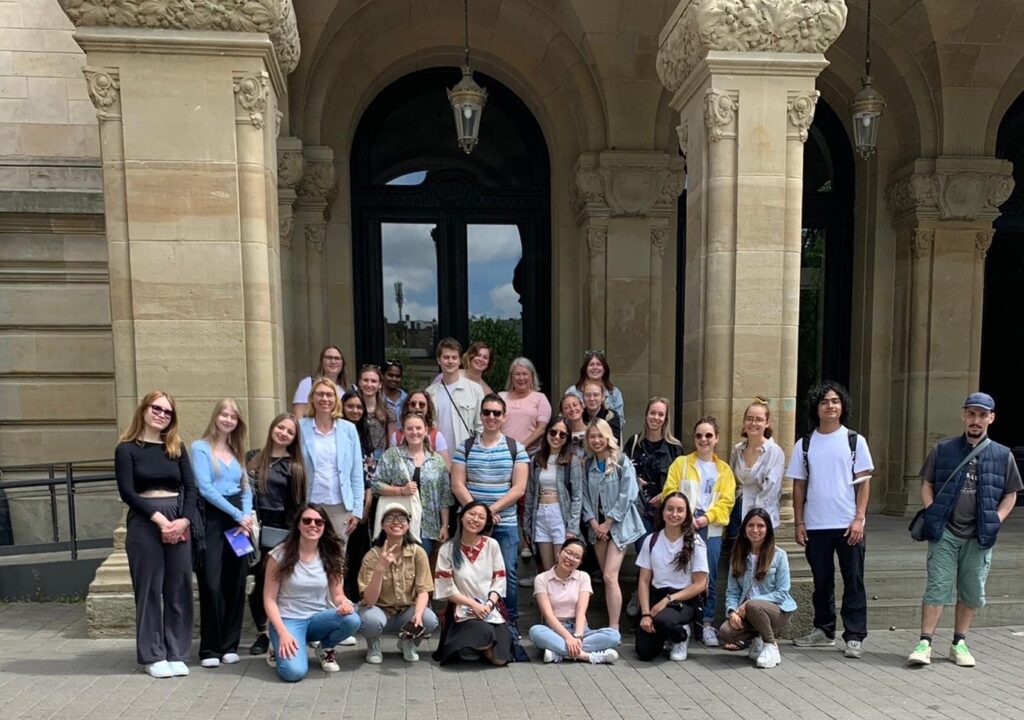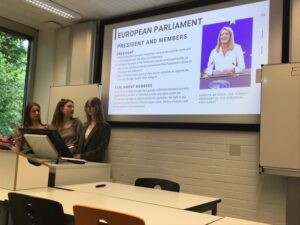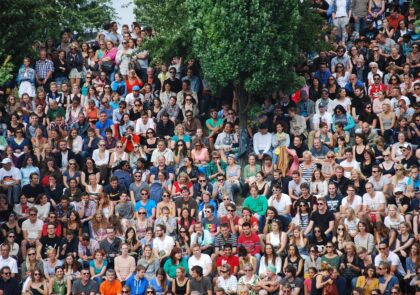
For many years already higher education institutions have hoped for the Erasmus+ programme to provide for financial support to create and to implement short-term intensive courses with a virtual part to be completed before the mobility. The new Blended Intensive Programme (BiP) took students of LAB University of Applied Sciences to the birth place of the European Union, to Saarbrücken, Luxemburg and Strasbourg to learn about European Union institutions and European identity.
Author: Jaana Häkli
A multicultural group of LAB students from degree programmes of tourism and hospitality took part in the intensive programme organized by LAB’s strategic partner, htw Saar in Germany. Language Centre carried out the intensive programme together with the partner and came up with the idea to incorporate students into developing their intercultural competence through learning about European identity, European institutions, and Greater Region as a concept because htw Saar is in Saarbrücken in Germany, just 10 kilometers from the border to France and Luxemburg. Greater Region is a regional branding concept that covers the states Saarland and Rheinland-Palatinate in Germany, Wallonia in Belgium, Lorraine in France, and the Grand Duchy of Luxemburg geographically. 11.6 million people live in this economic region where even 250,000 people commute daily from their home in one country to another country to work or simply to buy cheaper petrol for example in Luxemburg. The concept was created already in 1969 to promote cross-border collaboration and the peaceful coexistence of many nations in this multilingual and multicultural region. Additionally, the concept aims at developing higher education, logistics, culture as well as tourism and hospitality in the region. Some of the best German and French wines are produced in the region and Saarbrücken is famous for a street where three Michelin-star restaurants are located totaling with five stars altogether. The region is commonly seen as the haven of German cuisine due to the influence from French cuisine. (Grossregion 2022.)
The intensive programme included pre-assignments where students familiarized themselves with the Greater Region concept and European Union institutions in beforehand. In workshops on campus the work for the pre-assignments was presented by students and commented by a representative of the European Academy as well as htw Saar and LAB teachers.

Picture 1: LAB students presenting their pre-assignment on campus. (Image: Jaana Häkli)
Differences in European Identity
Students collaborated also on topics such as European identity – feeling as an insider or an outsider in Europe from the point of view of one’s nationality. It could be clearly seen how German and Finnish students identified themselves more as Europeans compared to students from Vietnam and Russia who commented then how the intensive programme gave them for the first time ever the feeling of being European as they had a chance to cross borders that were not seen without any passport control or when we visited the European Parliament on an excursion. Issues such as democracy and transparency in Europe became tangible when we entered the building without an ID check-up and the impressive open architecture of the building could be seen.
“Before the intensive week in Germany, I had struggled with identifying myself as European. However, during the program I became a part of Europe. Through traveling, meeting new people and learning about the Greater Region and European Institutions I felt European. That is why I am and will always be thankful for this opportunity and experience that I had.”, one of the participating students stated.
Young people are the future of Europe
A visit to the European Parliament was the highlight of the course for many. Especially students coming from Vietnam and Russia could not believe that they could enter the building without an ID check-up as they are not citizens of an EU country. Bags were x-rayed and we entered the building by walking through a metal detector but other than that nobody was interested in who we were which is a concrete feature of European democracy and transparency. There was no plenary session in the Parliament on the day of our visit because upper secondary school pupils from different European countries had conquered the venue for their Youth for Future seminar. It was interesting to follow how these pupils asked for a permission to speak from their seat, spoke for at most 1.5 min on the topic of global warming and even voted for and against for the proposals while listening to professionals’ simultaneous interpretation into various languages like the real members of the parliament do.
“Setting foot in the European Parliament is also something I never thought of. For an international student from Vietnam, perhaps I consider it a luxury. I found that place fully embodied the growth, safety, and diversity of Europe. The design from the outside to the inside, the details full of meaning that makes me even more excited and proud to be on this trip.”, one of the participating students reflected on her experience in the final essay.
During excursions students experienced their preparatory work hands-on and were able to see how professional guides use methods of storytelling and humor during guided tours. The intensive course also encouraged many students to study foreign languages as they noticed that you do not manage well in many establishments such as hotels, restaurants, and shops in English, but German skills are needed, or they got interested in conducting a longer student exchange abroad as now they got a first glimpse into the partner university by seeing their facilities and getting to know some of its professors and students. For many students a longer student exchange might not be even possible due to family reasons and hence these intensive programs provide at least a possibility for a short international mobility. Especially international students favor intensive programmes as a form of learning because they enable group travel to different countries, produce credit points that can be included in complementary or elective studies depending on the degree programme and hence enable speeding up graduation even. LAB University of Applied Sciences benefited also from students’ participation in the parallel Europe Week hosted by htw Saar as LAB students answered many questions asked by upcoming incoming exchange students from htw Saar to LAB. Hence, students acted as ambassadors of LAB and Finland – another example for European identity and European democracy.
References
Grossregion. 2022. [Viitattu 2.6.2022]. Saatavilla: https://www.grossregion.net/
Author
Jaana Häkli is a senior lecturer at LAB University of Applied Sciences and works as a project manager for the GLOBDIVES project.
Illustration: Jaana Häkli
Published 15.6.2022
Reference to this article
Häkli, J. 2022. Greater Region – in the footsteps of the European Union. LAB Pro. Cited and date of citation. Available at https://www.labopen.fi/lab-pro/greater-region-in-the-footsteps-of-the-european-union/






